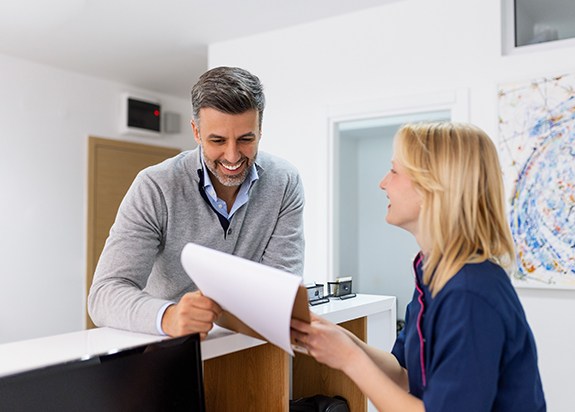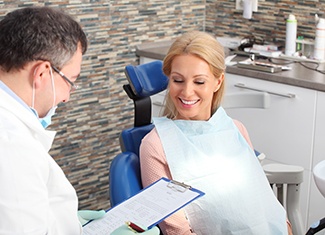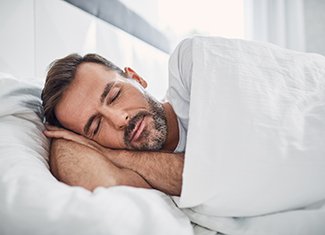Sleep Apnea Treatment – Fresno, CA
Good Rest
Can’t Wait

While snoring can keep you from a good night’s sleep, you shouldn’t dismiss it as just an annoyance. Often, it signifies sleep apnea, a medical condition that impacts an estimated 12 to 20 million Americans every night. Obstructive sleep apnea, the most common form, happens when the airway becomes blocked while you sleep. The lapses in breathing, which cause you to awaken and take a breath, can occur up to 30 times an hour and hundreds of times each night. We offer sleep apnea therapy in our Fresno, CA dental office to help patients stop snoring and start sleeping soundly.
Why Choose Byron L. Reintjes for Sleep Apnea Treatment?
- Customized Sleep Apnea Appliances
- Caring and Experienced Dental Team
- Multiple PPO Providers Accepted
What is Sleep Apnea?

There are a few different types of sleep apnea. The most common type is obstructive sleep apnea. This occurs when the muscles located in your throat and the back of your mouth relax and collapse causing a blockage in your airway. This can cause you to snore loudly and stop breathing repetitively as you sleep. Most people who have sleep apnea are unaware of it. Here are some of the most common symptoms that are experienced by sufferers:
- Daytime sleepiness
- Loud, chronic snoring
- Waking up with a sore throat
- Morning headaches
- Gasping for air
- Mood changes or irritability
- Memory loss
- Difficulty concentrating
The Dangers of Sleep Apnea

In addition to the symptoms listed above, sleep apnea can have very detrimental effects on health. People who lack quality sleep can struggle with focus, memory, depression, and reaction time. Untreated sleep apnea can also increase your risk of developing cardiovascular disease and experiencing a cardiovascular event, like a heart attack. Pregnant women with untreated sleep apnea are also at higher risk of having a pre-term birth due to an increase in blood pressure. Ultimately, if you are showing any signs of sleep apnea, it’s important that you seek treatment.
Sleep Apnea Treatment Options

Traditionally, sleep apnea has been treated with a CPAP machine. This method works by forcing air into the airway throughout the night. This is effective but doesn’t help to address the root causes of sleep apnea. Here are some of the alternative options we offer:
Sleep Apnea Appliances

To help you sleep and breathe deeply through the night, a custom-crafted oral appliance may offer a comfortable, portable alternative to traditional CPAP therapies. We typically use the Somnodent line of appliances because they offer a variety of options to ensure comfort and efficacy for almost any patient. Somnodent appliances can be used to address loud, chronic snoring without a sleep apnea diagnosis, and they are effective therapy for patients suffering from mild to moderate obstructive sleep apnea.
Learn more about Sleep Apnea Appliances
Vivos Sleep Apnea Treatment

Vivos is a non-surgical method for addressing maxillary hypoplasia and mandibular retrognathia, issues in the jaw that can compromise the upper airway and lead to repeated pauses in breathing. A daytime-nighttime appliance applies gentle pressure to the palate, gradually expanding it to correct these issues. Ultimately, it can help patients achieve a sounder sleep without the use of a CPAP machine.
Learn More About Vivos Sleep Apnea Treatment
Understanding the Cost of Sleep Apnea Treatment

The cost of sleep apnea treatment depends on a few factors. Our team will be happy to provide cost estimates and answer all your questions about paying for your care. We want the financial aspect of your treatment to cause as little stress as possible! You can rightly view your therapy as an investment that will reward you with a higher quality of life and improved overall wellness.
Does Dental Insurance Cover the Cost of Sleep Apnea Treatment?

No, dental insurance does not generally cover sleep apnea treatment. That is simply because, even though Dr. Reintjes is a dentist, sleep apnea is considered to be a general medical problem. Therefore, your health insurance is much more likely to pay for a portion of the cost of your care.
Factors That Affect the Cost of Sleep Apnea Treatment

Some factors that may have a bearing on the cost of your sleep apnea treatment include:
- Your medical insurance coverage. Most medical plans cover sleep apnea testing, CPAP therapy, and oral appliance therapy. Coverage levels can differ greatly depending on your policy. Also, keep in mind that you may have to get preauthorization from your insurer before they will cover your care.
- The type of care you receive. Oral appliance therapy, Vivos treatment, and other approaches to sleep apnea therapy come at different price points.
Treat Your Sleep Apnea Now to Improve Your Health

Treating your sleep apnea may require a significant amount of money upfront. However, it could save you money in the long run in at least a few different ways:
- Lower health risks. High-quality sleep is a pillar of good health. Addressing your sleep apnea may lower your risk of issues like diabetes, heart problems, and more. Therefore, it has the potential to reduce your overall medical costs.
- Lower risk of accidents. When you start getting enough rest, you will be less likely to be involved in an expensive and painful motor vehicle accident.
- Increased productivity. Being well-rested may help you perform well at work and reach your income goals.
Making Sleep Apnea Treatment More Affordable

Our team can help you file insurance claims. We are also partnered with CareCredit, a third-party lender that offers low-interest payment plans for both dental and medical services. The application process is fast, and most patients are deemed eligible for credit.
You can expect us to do all we can to make your treatment as affordable as possible!
Sleep Apnea Treatment FAQs

If left untreated, sleep apnea can be very dangerous and lead to serious health concerns down the line. Fortunately, Dr. Reintjes and the rest of the team have several different approaches for tackling this common condition and managing it to ensure proper breathing can take place. Of course, we understand you may have several lingering questions in mind before committing to the process. To help you out, we’ve decided to answer some of the top frequently asked questions below. Should you not find what you’re looking for, don’t hesitate to reach out for personal assistance.
What Is Obstructive Sleep Apnea (OSA)?
Obstructive sleep apnea (OSA) is a chronic condition that occurs when your muscles relax during sleep, allowing the soft tissue to collapse and block the airway. This can cause you to stop breathing multiple times per night for anywhere from a few seconds to more than a minute. Unfortunately, repeated breathing pauses can result in reduced oxygen levels and disturbances in sleep.
Are Oral Appliances for Sleep Apnea Effective?
Absolutely! Oral appliance therapy for sleep apnea is known to be quite effective. While other forms of treatment may have to be integrated, these oral devices ensure the airway stays uncompromised throughout the night. A significant advantage of oral appliance therapy is that it’s comfortable and does not require motorized machines, making sleeping easier and less restrictive.
How Long Does It Take to Adapt to a Sleep Apnea Appliance?
Most patients will adapt to their sleep apnea appliance within 2-7 days. This is relatively fast considering that it takes a few days to adapt to having a device in your mouth while you sleep. The appliance should not hurt your teeth at all! If your teeth do happen to feel sore following the initial use, don’t hesitate to let us know. We can easily adjust it for your comfort.
What Is the Difference Between Continuous Positive Airway Pressure (CPAP) Therapy and Oral Appliance Therapy?
Continuous positive airway pressure (CPAP) therapy involves wearing a mask that covers the nose and mouth. It allows air pressure to keep the airway open while you sleep.
Meanwhile, oral appliance therapy consists of wearing a custom-fit mouthguard during sleep to support the jaw in a forward position to help maintain an open airway. It’s far more comfortable than a CPAP mask because it’s custom-made to fit your mouth and is made of lightweight material. Over time, the oral appliance will be adjusted to ensure maximum comfort and effectiveness.
I Need a Checkup & Cleaning I Need a Dentist for My Child I am Worried About Bleeding Gums I Have a Cavity or Broken Tooth I am Missing One or More Teeth I am Unhappy with My Smile I Want a Straighter Smile I am Scared of the Dentist I Have Pain in My Jaw I am in Pain & Need Help I Need My Wisdom Teeth Removed View Our Services

